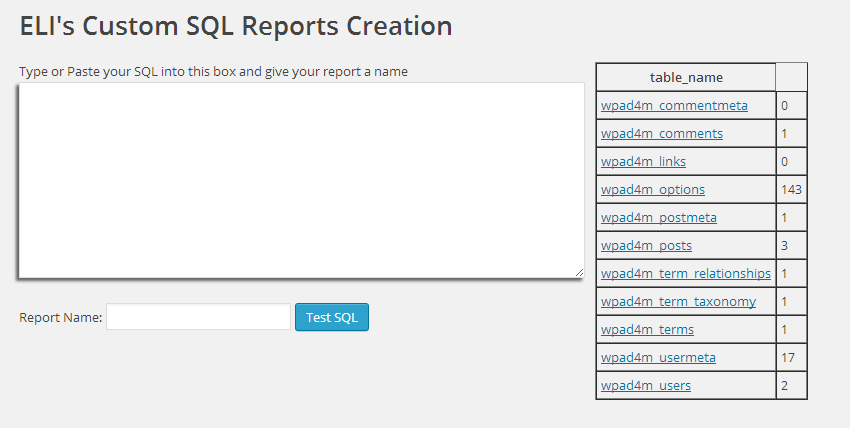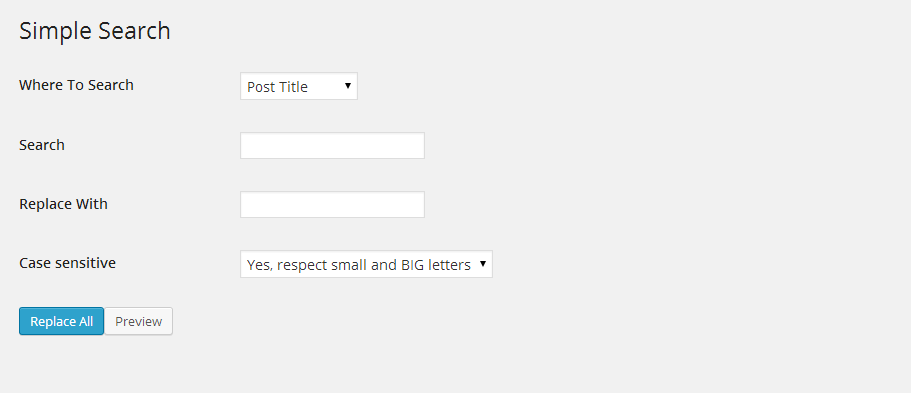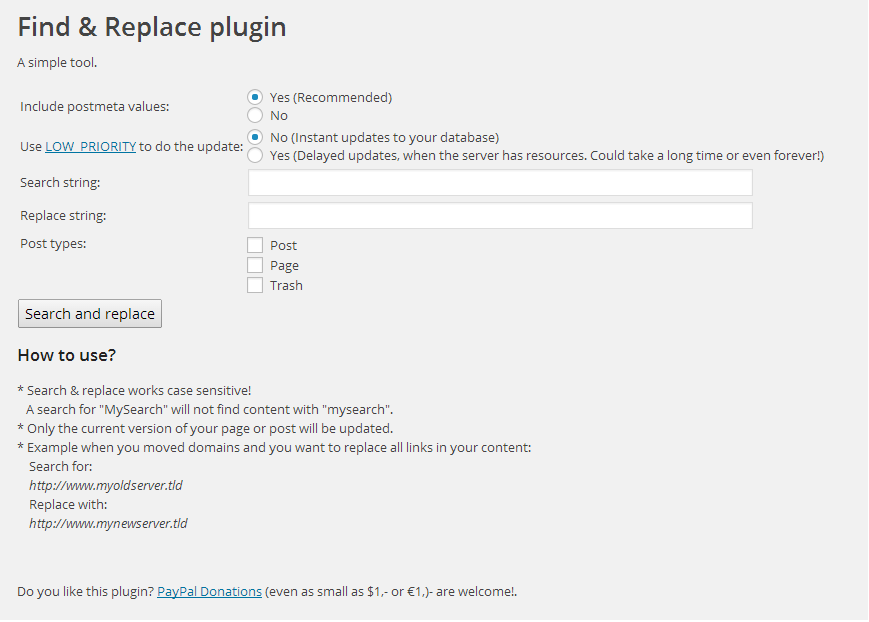Extending Outline
For many one-off development projects and almost all full website development projects, I often extend plugins. Most people place these extensions inside their functions.php file cluttering the file with all sorts of code. I prefer to separate my code base into parts that make sense. For example, if I am hooking into a Gravity Forms, even for only one hook, I create an extension plugin (e.g., Gravity Forms - Customizing Notifications).
For clarification purposes, let me define a couple of terms: extension plugin and dependency plugin.
- Extension Plugin
- A plugin that extends or increases the scope or application of another plugin (e.g., Gravity Forms - Date Range Field).
- Dependency Plugin
- A plugin that is dependent upon another plugin or needs another plugin for support or operation (e.g., Gravity Forms).
Potential Problems & Requirements
Creating an extension plugin that is dependent on a dependency plugin creates some potential problems. Some of these problems could be:
- White Screen of Death: Site breaks because of a missing function and/or class and the developer forgot to check whether the function or class exists (e.g.,
class_exists( 'My_Dependent_Class' )orfunction_exists( 'my_dependent_function' )). - The extension plugin doesn't deactivate when dependency plugin deactivates resulting in additional overhead or code bloating.
- The extension plugin is activated before the dependency plugin is activated, but WordPress says the plugin was activated.
To prevent these issues, we would like to:
- Prevent the activation of the extension plugin if the dependency plugin is not activated.
- Auto-deactivate the extension plugin if the dependency plugin is deactivated.
- Notify the user that the plugin has been deactivated and the reason why it has been deactivated to improve the user experience.,
.
So, I have a class that is part of my development framework called WPS_Extend_Plugin that makes this a piece of cake.
Demonstration
For demonstration purposes, I am going to extend Gravity Forms to create a new field called Date Range (plugin named: Gravity Forms - Date Range). My requirements are simple:
- I do not want to have this plugin activated without Gravity Forms activated.
- I want the plugin to auto-deactivate if Gravity Forms is deactivated.
- I want the user to know what happened
The Plugin Setup
As you can see from the screen capture are both of my plugins are not activated.

Activating the Extension Plugin without the Dependency Plugin Activated
In the example below, I activate the extension plugin without the dependency being activated. This will create two error notifications: one in the admin notices area and the other on the plugin row. However, as you can see WordPress does not "check" to see if the plugin actually activated. Instead, WordPress assumes the plugin was activated and outputs the activation message.
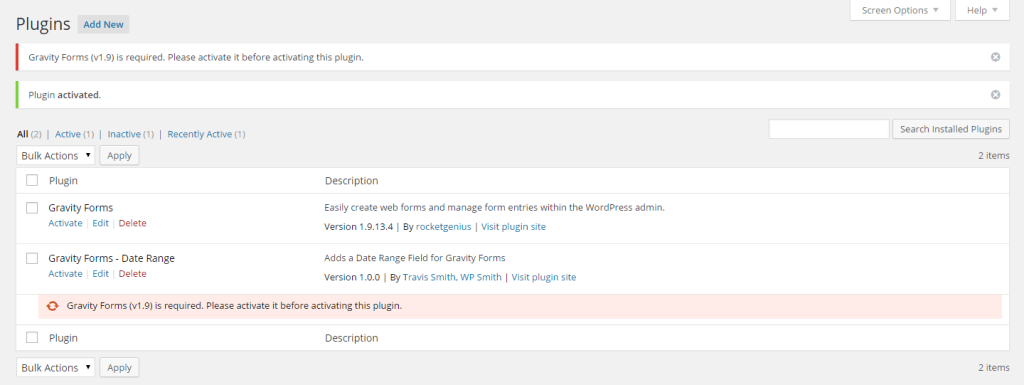
Activating the Dependency Plugin and Extension Plugin Properly
In this example, I activate both plugins "normally" and "properly" where I activate the dependency first and then the extension plugin second. Everything works as expected.


Activating the Extension Plugin without the Correct Dependency Plugin Version
In the example below, I activate the extension plugin without the proper dependency plugin version being activated. As you can see the dependency plugin exists and is activated; however, I have marked the extension plugin to depend on a version greater than the version that is activated. This too will create two error notifications: one in the admin notices area and the other on the plugin row. However, as you can see WordPress does not "check" to see if the plugin actually activated. Instead, WordPress assumes the plugin was activated and outputs the activation message.
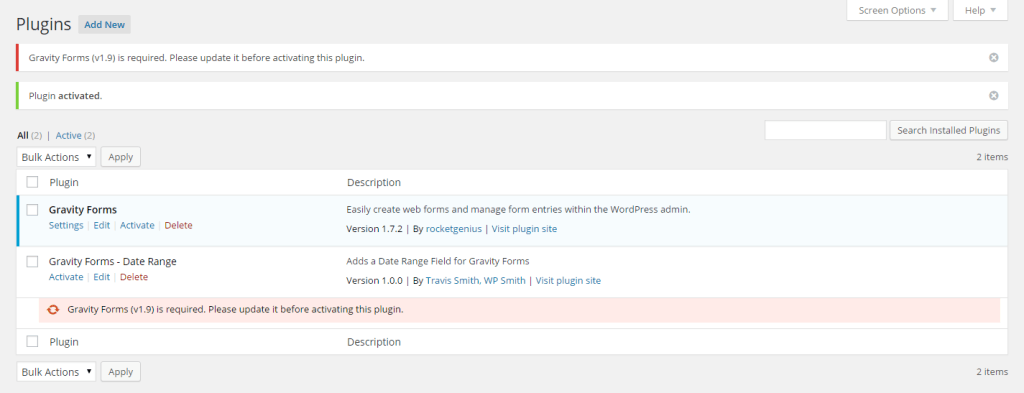
Usage
Using this class is quite simple. Just add it to your plugin in whatever directory and require the file.
| // Require WPS_Extend_Plugin class | |
| require_once( 'classes/WPS_Extend_Plugin.php' ); |
Then if you want to require a plugin, just instantiate the class. Here are two examples of extending Gravity Forms and AddThis.
| // Extend Gravity Forms | |
| new WPS_Extend_Plugin( 'gravityforms/gravityforms.php', __FILE__, '1.9', 'my-plugin-text-domain' ); | |
| // Extend AddThis | |
| new WPS_Extend_Plugin( 'addthis/addthis_social_widget.php', __FILE__, '1.9.13', 'my-plugin-text-domain' ); |
If you would like to require more than one plugin at a time, you can use my function wps_extend_plugins:
| if ( !function_exists( 'wps_extend_plugins' ) ) { | |
| /** | |
| * Determines whether the plugins are active and available taking appropriate action if not. | |
| * | |
| * @since Version 1.0.0 | |
| * @author Travis Smith <[email protected]> | |
| * | |
| * @see WPS_Extend_Plugin | |
| * | |
| * @param array $plugins | |
| * @param string $root_file Plugin basename, File reference path to root including filename. | |
| * @param string|null $text_domain Text domain. | |
| */ | |
| function wps_extend_plugins( $plugins, $root_file, $text_domain = null ) { | |
| $plugin_extensions = array(); | |
| foreach ( $plugins as $plugin => $min_version ) { | |
| $plugin_extensions[ $plugin ] = new WPS_Extend_Plugin( $plugin, $root_file, $min_version, $text_domain ); | |
| } | |
| } | |
| } |
This function can be used like this:
| // Extend Jetpack, Gravity Forms, Display Posts Shortcode, Soliloquy | |
| wps_extend_plugins( array( | |
| 'gravityforms/gravityforms.php' => '1.9', | |
| 'display-posts-shortcode/display-posts-shortcode.php' => '2.5', | |
| 'jetpack/jetpack.php' => '3.7', | |
| 'soliloquy/soliloquy.php' => '2.4.3', | |
| ), __FILE__, 'my-plugin-text-domain' ) |
The Class
| <?php | |
| /** | |
| * Contains WPS_Extend_Plugin class. and wps_extend_plugins function. | |
| * | |
| * @package WPS_Core | |
| * @author Travis Smith <[email protected]> | |
| * @copyright 2015 WP Smith, Travis Smith | |
| * @license http://opensource.org/licenses/gpl-2.0.php GNU Public License | |
| * @version 1.0.0 | |
| * @since File available since Release 1.0.0 | |
| */ | |
| if ( !class_exists( 'WPS_Extend_Plugin' ) ) { | |
| /** | |
| * Class WPS_Extend_Plugin | |
| * | |
| * Extends an existing plugin. | |
| * | |
| * @since Version 1.0.0 | |
| * @author Travis Smith <[email protected]> | |
| * | |
| */ | |
| class WPS_Extend_Plugin { | |
| /** | |
| * Dependent plugin name, plugin relative path (e.g., 'addthis/addthis_social_widget.php' ) | |
| * | |
| * @var string|array | |
| */ | |
| private $plugin = ''; | |
| /** | |
| * Action being performed on plugins page. | |
| * | |
| * @var string | |
| */ | |
| private $action = ''; | |
| /** | |
| * Minimum version of dependent plugin required. | |
| * @var string | |
| */ | |
| private $min_version; | |
| /** | |
| * Reference to the current plugin's root. | |
| * The full path and filename of the file with symlinks resolved. | |
| * | |
| * @var string | |
| */ | |
| private $root_file = __FILE__; | |
| /** | |
| * Text domain. | |
| * | |
| * @var string | |
| */ | |
| public $text_domain = 'wps'; | |
| /** | |
| * Message to be displayed. | |
| * | |
| * @var string | |
| */ | |
| public $message = ''; | |
| /** | |
| * Plugin data. | |
| * | |
| * @var array | |
| */ | |
| public $plugin_data = array(); | |
| /** | |
| * Transient name. | |
| * | |
| * @var string | |
| */ | |
| private $transient = ''; | |
| /** | |
| * Constructor | |
| * | |
| * @param string $plugin Plugin activation "slug" | |
| * @param string $root_file Plugin basename, File reference path to root including filename. | |
| * @param string|null $min_version Minimum version allowed. | |
| * @param string|null $text_domain Text domain. | |
| */ | |
| public function __construct( $plugin, $root_file, $min_version = null, $text_domain = null ) { | |
| // Setup | |
| $this->plugin = $plugin; | |
| $this->root_file = $root_file; | |
| $this->min_version = $min_version ? $min_version : $this->min_version; | |
| $this->text_domain = $text_domain ? $text_domain : $this->text_domain; | |
| $this->transient = substr( 'wpsep-' . plugin_basename( $root_file ), 0, 40 ); | |
| /* | |
| * Cannot add a notice since plugin has been deactivated | |
| * Add notice since WP always seems to assume that the plugin was updated. | |
| * Cannot use 'deactivate_' . $plugin hook as it does not fire if plugin is silently deactivated (such as during an update) | |
| */ | |
| if ( 'plugins.php' === basename( $_SERVER['PHP_SELF'] ) && ! ( defined( 'WP_CLI' ) && WP_CLI ) ) { | |
| $this->set_action_type(); | |
| // Add admin notice | |
| add_action( 'admin_notices', array( $this, 'admin_notice' ) ); | |
| // Late Deactivation so we can output the notifications | |
| add_filter( 'plugin_action_links_' . $plugin, array( $this, 'plugin_action_links_maybe_deactivate' ) ); | |
| add_filter( 'network_admin_plugin_action_links_' . $plugin, array( $this, 'plugin_action_links_maybe_deactivate' ) ); | |
| // Fix Current Plugin Action Links | |
| add_filter( 'plugin_action_links_' . plugin_basename( $root_file ), array( $this, 'plugin_action_links' ), 10, 4 ); | |
| add_filter( 'network_admin_plugin_action_links_' . plugin_basename( $root_file ), array( $this, 'plugin_action_links' ), 10, 4 ); | |
| // Add notice on Plugin Row | |
| add_action( 'after_plugin_row_' . plugin_basename( $root_file ), array( $this, 'plugin_row' ) ); | |
| } else { | |
| // Maybe deactivate on update of active_plugins and active_sitewide_plugins options | |
| // deactivated_plugin action and deactivate_ . $plugin do not fire if plugin is being deactivated silently | |
| add_action( 'update_option_active_sitewide_plugins', array( $this, 'maybe_deactivate' ), 10, 2 ); | |
| add_action( 'update_option_active_plugins', array( $this, 'maybe_deactivate' ), 10, 2 ); | |
| } | |
| } | |
| /** | |
| * Conditional helper function to determine which generic action is being taken. | |
| * | |
| * @param string $action Action ('activate' or 'deactivate'). | |
| * | |
| * @return bool Whether performing an activation action or deactivation action. | |
| */ | |
| private function is_action( $action ) { | |
| if ( 'activate' === $action ) { | |
| return ( 'activate' === $this->action || 'activate-multi' === $this->action ); | |
| } | |
| if ( 'deactivate' === $action ) { | |
| return ( 'deactivate' === $this->action || 'deactivate-multi' === $this->action ); | |
| } | |
| return false; | |
| } | |
| /** | |
| * Sets the action being taken by the plugins.php page. | |
| */ | |
| private function set_action_type() { | |
| if ( isset( $_REQUEST['deactivate-multi'] ) && $_REQUEST['deactivate-multi'] ) { | |
| $this->action = 'deactivate-multi'; | |
| } elseif ( isset( $_REQUEST['activate-multi'] ) && $_REQUEST['activate-multi'] ) { | |
| $this->action = 'activate-multi'; | |
| } elseif ( isset( $_REQUEST['deactivate'] ) && $_REQUEST['deactivate'] ) { | |
| $this->action = 'deactivate'; | |
| } elseif ( isset( $_REQUEST['activate'] ) && $_REQUEST['activate'] ) { | |
| $this->action = 'activate'; | |
| } | |
| } | |
| /** | |
| * Maybe fix the action links as WordPress believes the plugin is active when it may have been deactivated. | |
| * | |
| * @param array $actions An array of plugin action links. | |
| * @param string $plugin_file Path to the plugin file. | |
| * @param array $plugin_data An array of plugin data. | |
| * @param string $context The plugin context. Defaults are 'All', 'Active', | |
| * 'Inactive', 'Recently Activated', 'Upgrade', | |
| * 'Must-Use', 'Drop-ins', 'Search'. | |
| * | |
| * @return array $actions Maybe an array of modified plugin action links. | |
| */ | |
| public function plugin_action_links_maybe_deactivate( $actions ) { | |
| if ( ! $this->is_active() ) { | |
| self::deactivate_self( $this->root_file ); | |
| } | |
| return $actions; | |
| } | |
| /** | |
| * Maybe fix the action links as WordPress believes the plugin is active when it may have been deactivated. | |
| * | |
| * @param array $actions An array of plugin action links. | |
| * @param string $plugin_file Path to the plugin file. | |
| * @param array $plugin_data An array of plugin data. | |
| * @param string $context The plugin context. Defaults are 'All', 'Active', | |
| * 'Inactive', 'Recently Activated', 'Upgrade', | |
| * 'Must-Use', 'Drop-ins', 'Search'. | |
| * | |
| * @return array $actions Maybe an array of modified plugin action links. | |
| */ | |
| public function plugin_action_links( $actions, $plugin_file, $plugin_data, $context ) { | |
| if ( ! $this->is_active() ) { | |
| if ( isset( $actions['deactivate'] ) ) { | |
| $params = self::get_url_params( $actions['deactivate'] ); | |
| $params = wp_parse_args( $params, array( 's' => '', ) ); | |
| unset( $actions['deactivate'] ); | |
| // Change action link deactivate to activate | |
| $screen = get_current_screen(); | |
| if ( $screen->in_admin( 'network' ) ) { | |
| if ( current_user_can( 'manage_network_plugins' ) ) { | |
| /* translators: %s: plugin name */ | |
| $actions['activate'] = '<a href="' . wp_nonce_url( 'plugins.php?action=activate&plugin=' . $plugin_file . '&plugin_status=' . $context . '&paged=' . $params['paged'] . '&s=' . $params['s'], 'activate-plugin_' . $plugin_file ) . '" class="edit" aria-label="' . esc_attr( sprintf( __( 'Network Activate %s' ), $plugin_data['Name'] ) ) . '">' . __( 'Network Activate' ) . '</a>'; | |
| } | |
| if ( current_user_can( 'delete_plugins' ) ) { | |
| /* translators: %s: plugin name */ | |
| $actions['delete'] = '<a href="' . wp_nonce_url( 'plugins.php?action=delete-selected&checked[]=' . $plugin_file . '&plugin_status=' . $context . '&paged=' . $params['paged'] . '&s=' . $params['s'], 'bulk-plugins' ) . '" class="delete" aria-label="' . esc_attr( sprintf( __( 'Delete %s' ), $plugin_data['Name'] ) ) . '">' . __( 'Delete' ) . '</a>'; | |
| } | |
| } else { | |
| /* translators: %s: plugin name */ | |
| $actions['activate'] = '<a href="' . wp_nonce_url( 'plugins.php?action=activate&plugin=' . $plugin_file . '&plugin_status=' . $context . '&paged=' . $params['paged'] . '&s=' . $params['s'], 'activate-plugin_' . $plugin_file ) . '" class="edit" aria-label="' . esc_attr( sprintf( __( 'Activate %s', $this->text_domain ), $plugin_data['Name'] ) ) . '">' . __( 'Activate', $this->text_domain ) . '</a>'; | |
| if ( ! is_multisite() && current_user_can( 'delete_plugins' ) ) { | |
| /* translators: %s: plugin name */ | |
| $actions['delete'] = '<a href="' . wp_nonce_url( 'plugins.php?action=delete-selected&checked[]=' . $plugin_file . '&plugin_status=' . $context . '&paged=' . $params['paged'] . '&s=' . $params['s'], 'bulk-plugins' ) . '" class="delete" aria-label="' . esc_attr( sprintf( __( 'Delete %s', $this->text_domain ), $plugin_data['Name'] ) ) . '">' . __( 'Delete', $this->text_domain ) . '</a>'; | |
| } | |
| } | |
| } | |
| } | |
| return $actions; | |
| } | |
| /** | |
| * Outputs an admin notice if plugin is trying to be activated when dependent plugin is not activated. | |
| */ | |
| public function admin_notice() { | |
| if ( ! $this->is_active() ) { | |
| printf( '<div class="error notice is-dismissible"><p class="extension-message">%s</p></div>', $this->get_message() ); | |
| } | |
| } | |
| /** | |
| * Deactivate ourself if dependent plugin is deactivated. | |
| * | |
| * @param mixed $old_value The old option value. | |
| * @param mixed $value The new option value. | |
| */ | |
| public function maybe_deactivate( $old_value, $value ) { | |
| if ( ! $this->is_active() ) { | |
| self::deactivate_self( $this->root_file ); | |
| if ( defined( 'WP_CLI' ) && WP_CLI ) { | |
| WP_CLI::error( $this->get_message( 'deactivate' ) ); | |
| } | |
| } | |
| } | |
| public function recently_activated( $value, $old_value ) { | |
| //$this->pr( $old_value, '$old_value' ); | |
| //$this->pr( $value, '$value' ); | |
| $current = array_diff_key( $value, $old_value ); | |
| //$this->pr( $current, '$current' ); | |
| //wp_die(); | |
| // Check if our plugin was just now deactivated | |
| if ( isset( $current[ $this->plugin ] ) ) { | |
| $this->set_transient( 'was_active', 1 ); | |
| } | |
| return $value; | |
| } | |
| /** | |
| * Returns the message to be displayed. | |
| * | |
| * @return string Message | |
| */ | |
| private function get_message() { | |
| return $this->message; | |
| } | |
| /** | |
| * Sets the message based on the needed notification type. | |
| * | |
| * @param string $type Notification type (deactivate, activate, update). | |
| */ | |
| private function set_message( $type ) { | |
| $dependency = $this->get_plugin_data( 'Name' ) ? $this->get_plugin_data( 'Name' ) : $this->plugin; | |
| switch ( $type ) { | |
| case 'deactivate': | |
| $current = $this->get_plugin_data( 'Name', 'current' ) ? $this->get_plugin_data( 'Name', 'current' ) : plugin_basename( $this->root_file ); | |
| $this->message = sprintf( | |
| __( '%1$s (v%2$s) is required for %3$s. Deactivating %3$s.', $this->text_domain ), | |
| $dependency, | |
| $this->min_version, | |
| $current | |
| ); | |
| break; | |
| case 'upgrade': | |
| case 'update': | |
| case 'activate': | |
| default: | |
| if ( 'update' === $type || 'upgrade' === $type || !$this->is_plugin_at_min_version() ) { | |
| $action = 'update'; | |
| } else { | |
| $action = 'activate'; | |
| } | |
| $this->message = sprintf( | |
| __( '%s (v%s) is required. Please %s it before activating this plugin.', $this->text_domain ), | |
| $dependency, | |
| $this->min_version, | |
| $action | |
| ); | |
| break; | |
| } | |
| } | |
| /** | |
| * Returns the plugin data. | |
| * | |
| * @param null|string $attr Specific data to return. | |
| * @param null|string $plugin Specific plugin to return plugin_data. | |
| * | |
| * @return string|array Specific attribute value or all values. | |
| */ | |
| private function get_plugin_data( $attr = null, $plugin = null ) { | |
| // Default to dependency plugin | |
| if ( ! $plugin || 'dependency' === $plugin ) { | |
| $plugin = $this->plugin; | |
| $plugin_path = trailingslashit( plugin_dir_path( dirname( $this->root_file ) ) ) . $this->plugin; | |
| // Allow current plugin_data to be returned | |
| } elseif ( 'current' === $plugin ) { | |
| $plugin = plugin_basename( $this->root_file ); | |
| $plugin_path = plugin_dir_path( dirname( $this->root_file ) ) . plugin_basename( $this->root_file ); | |
| // Un-supported plugin request, do nothing | |
| } else { | |
| return array(); | |
| } | |
| // Maybe get fresh plugin_data | |
| if ( ! isset( $this->plugin_data[ $plugin ] ) || ( isset( $this->plugin_data[ $plugin ] ) && ! $this->plugin_data[ $plugin ] ) ) { | |
| require_once(ABSPATH . 'wp-admin/includes/plugin.php'); | |
| $this->plugin_data = get_plugin_data( $plugin_path, false, false ); | |
| } | |
| // Maybe return specific attribute | |
| if ( $attr && isset( $this->plugin_data[ $attr ] ) ) { | |
| return $this->plugin_data[ $attr ]; | |
| } | |
| // Return everything | |
| return $this->plugin_data; | |
| } | |
| /** | |
| * Returns an array of parameters from HTML markup containing a link. | |
| * | |
| * @param string $text HTML to be parsed. | |
| * | |
| * @return array Associative array of parameters and values. | |
| */ | |
| private static function get_url_params( $text ) { | |
| // Capture parameters | |
| preg_match( "/<a\s[^>]*href=\"([^\"]*)\"[^>]*>(.*)<\/a>/", $text, $output ); | |
| if ( $output ) { | |
| preg_match_all( '/([^?&=#]+)=([^&#]*)/', html_entity_decode( urldecode( $output[1] ) ), $m ); | |
| //combine the keys and values onto an assoc array | |
| return array_combine( $m[1], $m[2] ); | |
| } | |
| return array(); | |
| } | |
| /** | |
| * Deactivates the plugin. | |
| * | |
| * Function attempts to determine whether to deactivate extension plugin based on whether the depdendent | |
| * plugin is active or not. | |
| * | |
| * @uses deactivate_plugins Deactivate a single plugin or multiple plugins. | |
| * | |
| * @param string $file Single plugin or list of plugins to deactivate. | |
| * @param mixed $network_wide Whether to deactivate the plugin for all sites in the network. | |
| * A value of null (the default) will deactivate plugins for both the site and the | |
| * network. | |
| */ | |
| public static function deactivate_self( $file, $network_wide = false ) { | |
| if ( is_multisite() && false !== $network_wide ) { | |
| $network_wide = is_plugin_active_for_network( $file ); | |
| } | |
| deactivate_plugins( plugin_basename( $file ), true, $network_wide ); | |
| } | |
| /** | |
| * Checks whether the dependent plugin(s) is/are active by checking the active_plugins list. | |
| * | |
| * @return bool Whether the dependent plugin is active. | |
| */ | |
| public function is_active() { | |
| $active = true; | |
| // Check Plugin Active | |
| if ( ! is_plugin_active( $this->plugin ) ) { | |
| if ( $this->is_action( 'activate' ) ) { | |
| $this->set_message( 'activate' ); | |
| } elseif ( $this->is_action( 'deactivate' ) ) { | |
| $this->set_message( 'deactivate' ); | |
| } | |
| return false; | |
| } | |
| // Plugin Active, Check Version | |
| if ( ! $this->is_plugin_at_min_version() ) { | |
| $this->set_message( 'update' ); | |
| return false; | |
| } | |
| // Maybe remove was_active transient | |
| // if ( $active ) { | |
| // $this->delete_transient( 'was_active' ); | |
| // } | |
| // All Good! | |
| return $active; | |
| } | |
| /** | |
| * Determins whether the given plugin is at the minimum version. | |
| * | |
| * @return bool Whether the plugin is at the minimum version. | |
| */ | |
| private function is_plugin_at_min_version() { | |
| if ( ! $this->min_version ) { | |
| return true; | |
| } | |
| return ( floatval( $this->get_plugin_data( 'Version' ) ) >= floatval( $this->min_version ) ); | |
| } | |
| /** | |
| * Adds a notice to the plugin row to inform the user of the dependency. | |
| */ | |
| public function plugin_row() { | |
| if ( ! $this->is_active() ) { | |
| printf( '</tr><tr class="plugin-update-tr"><td colspan="5" class="plugin-update"><div class="update-message" style="background-color: #ffebe8;">%s</div></td>', $this->get_message() ); | |
| } | |
| } | |
| } | |
| } |
Known Issues/To Do Item
WordPress outputs a message "Plugin reactivated successfully." regardless of whether the plugin was activated or not, since activate_plugin() does not return a Boolean response based on whether the plugin was actually activated (activate_plugin() always returns null or a WP_Error). I hope to fix this in a future revision (most likely via inline JavaScript as I want to keep everything contained within the class).







